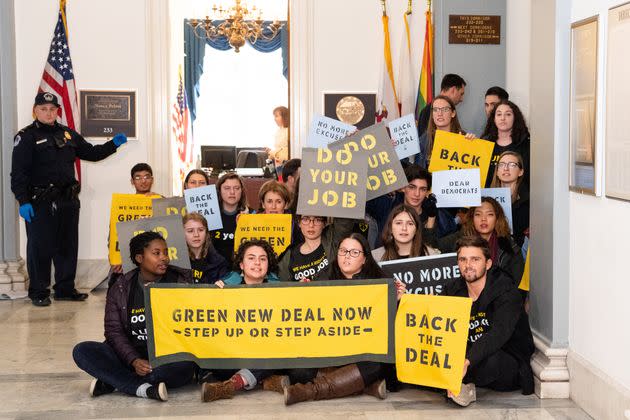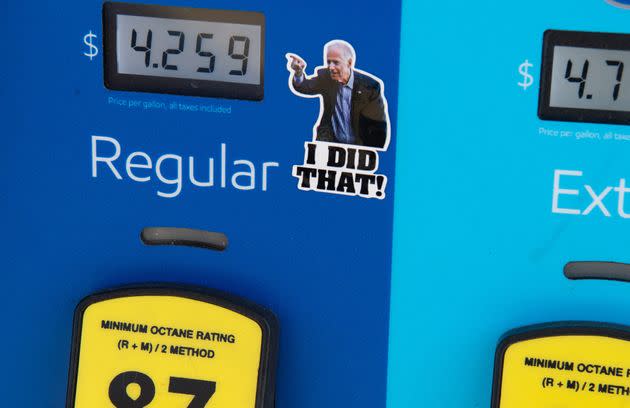Gas Price Hikes Test The Climate Action Movement
- Oops!Something went wrong.Please try again later.
Some environmentalists welcomed the last major surge in gasoline prices in the late 2000s as the kind of push that Americans needed to quit fossil fuels.
This time around, the climate action movement has ― with rare exception ― given up on that idea.
The reasons for that change are twofold. Progressives have concluded that to be viable, climate policy must fuel prosperity. And, perhaps more importantly, rising prices at the pump threaten the political coalition that climate activists need to advance their goals.

Indeed, the present gas price spike is perhaps the biggest political test of a climate movement that has been ascendant since the waning years of the Obama presidency.
“If the Democrats lose the majority in either house, climate change is out the window. It’s not going to be addressed at any level,” said Mike Mikus, a Pittsburgh-based Democratic strategist. “The way you lose an election is to disregard people’s concerns. And their concerns are: They’re paying way too much at the gas pump.”

Biden’s Careful Balance
Gasoline prices rose above $4 a gallon earlier this month, breaking the previous record set in July 2008.
The price surge is mainly the product of post-pandemic demand outstripping fuel supply.
President Joe Biden’s climate policies, designed to reduce reliance on fossil fuels over the medium and long term, have had little discernible impact on current prices.
He has committed to achieving net zero carbon emissions by 2050, meaning America’s forests, farm fields and clean-industrial projects would remove more carbon from the atmosphere each year than the country’s cars, power plants and factories emit. To achieve that goal, he passed an infrastructure bill with some renewable energy incentives and pursued a much more ambitious set of renewable energy tax credits as part of the stalled Build Back Better legislation. Using the powers of the executive branch, Biden also revoked authorization for the Keystone XL oil pipeline and raised federal fuel-economy standards for cars and trucks.
But Biden’s lack of responsibility for the current situation doesn’t mean that ailing consumers won’t blame him for it.
To provide short-term relief to consumers ― and shore up his political standing ― Biden has taken some steps to encourage additional oil and gas production. He asked the Organization of the Petroleum Exporting Countries (OPEC) to pump more oil in August, and announced the release of 50 million barrels of oil from the United States’ Strategic Petroleum Reserve in November. He is also using his bully pulpit to shame major oil and gas producers out of alleged price gouging.
A White House spokesperson maintained that Biden does not believe his efforts to increase supply in the near term conflict with his climate change goals.
“We believe we can walk and chew gum,” the spokesperson said.
So long as Biden does not reauthorize Keystone XL, which would incentivize fossil-fuel extraction over the long term, the president’s efforts to limit the political fallout from higher gas prices are compatible with Biden’s plans to phase out fossil fuels, according to Andrew Dessler, an atmospheric scientist at Texas A&M University.
“The single most important thing we need to do is start down the road” of switching to cleaner energy, Dessler said. “I don’t know how fast we can decarbonize, but I’m guessing it’s going to be a lot easier than people think.” He noted the speed with which wind and solar energy have dropped in price with a boost from the federal government.
The White House reaffirmed to HuffPost that it has no plans to resurrect Keystone XL.
The eyes of history are on Joe Biden and the choice he faces.John Paul Mejia, Sunrise Movement
But Biden’s tightrope walk ― balancing long-term renewable targets with short-term oil and gas price increases ― has come with a cost, adding progressive criticism to the steady barrage incoming from the GOP. Varshini Prakash, executive director of the youth-led Sunrise Movement, said she was “enraged” by Biden’s release of oil from the Strategic Petroleum Reserve and warned Biden that he “can’t be the climate president when he is actively selling our water to the highest bidder and lobbying oil states to produce more fossil fuels.”
Even Biden’s decision on Tuesday to increase liquefied natural gas exports to Europe to decrease reliance on Russian gas has elicited criticism. “Peace will only come through accelerating the transition to renewable energy, not by trading Russian oligarchs for American oil and gas barons,” Ashley Thomson, a Greenpeace USA senior climate campaigner, said in a Wednesday statement.
Both Greenpeace USA and the Sunrise Movement are calling for Biden to declare a climate emergency and use the Defense Production Act, which allows the federal government to commandeer manufacturing operations under emergency circumstances, to expedite the transition to renewable energy.
“That’s the sort of action that he needs to meet his rhetoric with,” said John Paul Mejia, a Sunrise spokesperson. “The eyes of history are on Joe Biden and the choice he faces.”
At the same time, none of Biden’s steps to increase oil and gas production has blunted the attacks of Republicans who blame Biden’s renewable energy promotion for rising gas prices. In an opinion piece earlier this month that doubled as a foreign-policy critique, House Republican leader Kevin McCarthy (Calif.) singled out the decision to block Keystone XL for condemnation. “The solution is obvious: rapidly increase American energy production, thus replacing Russian oil and gas with energy made in the U.S.A.,” he wrote.

There is not much evidence to back up McCarthy’s argument. Experts say Keystone XL would have increased oil production only by a negligible amount. And as the White House has noted, thousands of permits to drill for oil and gas on federal lands and seabeds — many of them distributed by Biden — remain unused.
“They’re not drilling on any of those 12,000 leases,” Sen. Ed Markey (D-Mass.), the Senate’s leading progressive climate hawk, told HuffPost. “It’s an area the size of Indiana and it’s just sitting there waiting for the oil and gas industry to drill on it.”
But the pressure on Biden from both sides puts him in a delicate position as he struggles to lift an approval rating so low it is a drag on Democrats down the ballot.
“Democrats are in a ‘damned if you do, damned if you don’t’ situation,” said Danielle Deiseroth, lead climate strategist for Data for Progress, a polling and advocacy group.
Deiseroth’s polling research suggests that Democrats and the progressives hoping to influence them would be better off using language calling for a “transition” away from fossil fuels and investment in renewable energy, rather than cutting off oil and gas immediately as some leftists would prefer.
There’s no quick and easy diet pill here, and a starvation diet is unhealthy and counterproductive.Julio Friedmann, Columbia University’s Center on Global Energy Policy
“Democrats by nature win because of a very broad, diverse coalition,” she added. “And it’s a lot harder to wrangle the cats and wrangle the messaging as well when you have competing interests within your own base.”
And experts say progressives’ more ambitious demands ― such as using the Defense Production Act to convert U.S. factories to mass-produce electric heat pumps that could be shipped to Europe to reduce the continent’s dependence on Russian gas for heating ― are easier said than done.
“The idea that we’d somehow co-opt the factory floor of a Ford plant to make heat pumps doesn’t pass the laugh test,” said Julio Friedmann, a senior research fellow at Columbia University’s Center on Global Energy Policy. “It’s not that we couldn’t but that’s not going to happen by summer.”
In short, he said there is no quick fix to zero out Russian fossil fuels on the global market, much less rapidly end gas use in a matter of months. Instead, the U.S. should promote serious infrastructure investments in Europe, including clean-fuel import terminals and new transmission lines to carry electricity southward from Northern Europe.
“There’s no quick and easy diet pill here, and a starvation diet is unhealthy and counterproductive,” Friedmann said. “Change your diet, hit the gym. Changing your diet is bringing in lower-carbon and zero-carbon fuels, whether that’s electricity from the Nordic countries or ammonia from around the world ... and the exercise is building infrastructure. That’s hitting the gym.”

The Left’s Path Forward
The political upshot of the Republican effort to blame Biden for higher gasoline prices is another obstacle for Democrats to overcome as they seek to minimize their losses in November’s midterm elections.
That has prompted some Democrats to chide climate activists for focusing too much on nudging Democrats to the left and not enough on just electing Democrats.
“The current circumstance shows that the environmental groups have been misguided in trying to shut everything down immediately,” said Mikus, who has advised candidates and labor unions in natural gas-heavy Pennsylvania.
Sunrise and like-minded groups reached influential new heights during the Democratic presidential primary. The group gave Biden’s climate change plan a failing grade in December 2019 when it released a comprehensive scorecard of the Democratic candidates.
Biden took pains to woo skeptical environmental groups ― and sometimes got in his own way in the process. Among other missteps, Biden said “yes” when a New Hampshire voter asked him if he wanted to end fracking, despite his opposition to a fracking ban. Likewise, a primary debate promise to end oil and gas drilling on federal lands and seabeds never came to fruition, which had the compound effect of disappointing activists while handing Republicans a damning video clip to wield against Biden.
“Pushing Democrats to be even more aggressive risks harmful electoral backlash,” the political blogger Matt Yglesias wrote in a Wednesday critique that focused on the boundary-pushing Sunrise Movement. “And punishing Democrats for being prudent makes things even worse.”
But members of the left flank of the climate movement note that they have taken a pragmatic approach since the 2020 election. In fact, these activists point out, progressives have proved more loyal to Biden than the most conservative Democrats in Congress, and repeatedly adjusted their expectations downward as Build Back Better failed to get off the ground.
The last flicker of hope for climate legislation before a bruising midterm election cycle lies in whatever climate provisions Senate Majority Leader Chuck Schumer (D-N.Y.) can convince Sen. Joe Manchin (D-W.Va.) to accept in a scaled-down spending bill.
“We’re now on Plan D or E,” Deiseroth said. “We’re ready to just get anything across the finish line at this point.”
And even more moderate climate activists see the current moment as an opportunity to affirm the case for reducing dependence on fossil fuels ― and the authoritarian governments they enrich ― once and for all. Conservative calls for looser oil drilling rules appear to ignore that the United States is already a net oil exporter. The United States’ continued dependence on fossil fuels for consumption, however, means that the country’s economy ― and the geopolitical balance of power with rivals like Russia ― is still subject to the ups and downs of the global oil market.
The only way to free ourselves from reckless foreign leaders like Vladimir Putin and others is to wean ourselves off of oil sooner than later.David Kieve, Environmental Defense Action Fund
“The only way to free ourselves from reckless foreign leaders like Vladimir Putin and others is to wean ourselves off of oil sooner than later,” said David Kieve, a former Biden administration climate adviser who now runs the Environmental Defense Action Fund, a mainstream liberal group.
Biden himself said something similar when he announced a ban on Russian oil imports earlier this month, arguing that his action should “motivate us to accelerate the transition to clean energy.”
In that context, the oil and gas industry’s calls for weaker environmental regulations likely have more to do with their future profits than with the country’s long-term interests.
“This is kind of like your heroin dealer telling you the solution to your problems is more heroin,” said Dessler, the Texas A&M scientist.
Some groups on the left have also come under fire for failing to embrace nuclear energy, which generates zero carbon emissions but has spooked many liberals concerned about accidents and the difficulties associated with storing nuclear waste.
Whether building new nuclear energy reactors is necessary for achieving net zero carbon emissions is the subject of heated debate. In what is perhaps an effort to skirt those complexities, the Sunrise Movement does not have a position of any kind on nuclear energy, Mejia told HuffPost.
But if the benefits of expanding nuclear energy are debatable, the costs of decommissioning existing nuclear plants are relatively clear. When New York state shuttered the Indian Point nuclear energy plant last April, it forced New York City to become more reliant on natural gas for its electricity. And Germany, which began phasing out nuclear energy in 2011, largely replaced nuclear power with coal, a much dirtier source of energy.
“It’s absolutely insane to turn off gigawatts of carbon-free energy,” Dessler said. “That’s a tragedy.”
This article originally appeared on HuffPost and has been updated.
